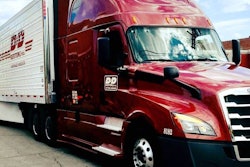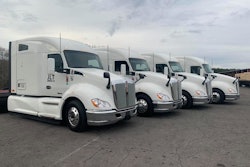
Born in a 17th century London coffee house, Lloyd’s — and, with it, the modern insurance industry — was built on trusted human relationships.
We only need to look at an exemplar, like the Fireman’s Fund Insurance Company, for glimpses at our industry’s storied history. Perhaps you’ll recall, this particular firm honored each and every claim it received in the wake of the 1906 San Francisco earthquake and fire, even though all of its records had been destroyed.
More recently, however, that trust has been shaken.
A series of mismanaged liabilities and massive losses in the late 80s through the early 2000s nearly collapsed the Lloyd’s of London market. And, those losses raised questions about the industry's capacity for distinct types of risks and the financial solvency of other insurers — a contagion that impacted trust in insurance across the U.S. and precipitated the plummeting value of U.S-based property-liability insurers.
Now, two decades later, the insurance industry still has a long way to go toward restoring that broken trust. In fact, according to a 2020 IBM Institute for Business Value study, 42% of insureds still lack confidence that their insurer will be there for them when they encounter a loss.
While it might seem counterintuitive on its face, I believe artificial intelligence (AI) and automation will serve as the conduit for returning our industry to its human-centric roots and restoring that faith.
Rapidly processing claims to rebuild trust
Insureds have been burned, and their memories are long. At the end of the day, their negative perceptions of the insurance industry are driven by where the rubber meets the road — claims.
If the established insurance industry players wish to rebuild bridges, they must not only pay legitimate claims but pay them quickly — rapidly returning clients to solid financial footing and enabling them to get back to their day-to-day business.
Automation and AI will be critical in meeting this challenge. How?
Leveraging historical claims data, machine learning platforms can automatically identify established patterns and respond in real-time, while continually building new predictive responses to edge cases. Combine this with payment automation tech, where money can be instantly placed into accounts, and the entire process can be seamless, even life-changing.
The result: The vast majority of claims that once took weeks or months to settle through traditional processes will be resolved in seconds, and payments will be delivered in near-real-time, ensuring clients are rapidly made whole.
Delivering smart risk advice and responsive, empathic service
The value of today’s traditional insurance policy comes down to the paper it's written on — the amount it will payout in the event of a claim.
AI and automation will change that paradigm.
Delivering active risk management, clients will be empowered to proactively suppress losses—as well as mitigate their associated impacts on customer loyalty and brand reputation, which can be difficult to recover from. This is a benefit that can only be realized through an approach that collects and analyzes vast amounts of anonymized data and shares it through automated loss prevention recommendations and subsequent real-world impact measurements.
Ultimately, this active risk management will become more important than the actual paper itself. Yes, policies will always be in place to protect against significant catastrophes, but this ecosystem will create more actionable data and alerts, guiding reports, and just-in-time suggestions—reducing losses and rewarding insureds for adopting active measures through increasingly better pricing.
Insurance wholesalers and retail brokers, meanwhile, will be freed from the time-consuming task of managing high volume, low complexity risk to, instead, guide clients through emotionally charged decisions about complex risk and worst-case scenarios.
And, it’s this combination of active risk management and exceptional service delivery that will heighten client trust in their insurance wholesalers and retail brokers. Increasingly, they’ll come to see them as responsive partners actively engaged in their risk mitigation.
Better serving clients through accessible coverage and sustainable pricing
Business professionals have long demonstrated a desire to service their B2B needs digitally and on-demand — a trend that is rapidly extending to insurance. Meanwhile, they’re also clamoring for more stable pricing, especially now as they deal with pandemic uncertainty.
Embedded insurance provides a digital door to exceeding client expectations.
Powered by AI and automation (and fed vast quantities of newly-visible, real-time data) embedded insurance solutions deliver anytime-access to instant cost-effective coverage. And, launched directly into wholesale and retail networks (and even into client workflows) it becomes easy for clients to self-service when and where they're most motivated to purchase.
This newly-expanded data visibility delivers stable costs to balance sheets and minimizes the pricing fluctuations that often frustrate clients. Meaning, not only can insurance wholesalers and retail brokers tap entirely new markets and open up passive revenue streams, this more sustainable business model ensures they'll have the resources to support their clients when things do go wrong.
In giving customers the experience and stability they want (and reliably delivering on expectations) the industry can go a long way toward restoring broken trust.
Protecting the future growth of underserved businesses
Insurance has become a very one-dimensional business, and is it any wonder? Focused on where it could make money, the industry served the needs of larger enterprises—enterprises equipped with risk management teams whose responsibility it was, and is, to cover risk transfer and ensure the right policies are in place.
Meanwhile, SMBs who are less sophisticated purchasers of insurance, less aware of their risks, and have been viewed as not worth the hassle—the very clients most in need of a trusted advisor—have been underserved for a very long time. Instead, presented with expensive annual covers as their only option, they’ve become accustomed to operating with broad risk exposure.
With cutting-edge technologies now available, insurance markets can now evaluate the spectrum of industries and businesses they serve, and better support their communities.
Insurance wholesalers and retail brokers don’t need to segregate particular sectors, simply because they’re new to the market or too small from a revenue perspective. The simple fact is, AI and automation render their size irrelevant. Technology can now deliver affordable, low-to-no touch coverage to every business, while also driving new revenue for insurers. It’s simply a matter of building awareness that tech solutions can affordably transfer SMB risk on a transactional basis.
In delivering protection to every business, the insurance industry can address the negative perceptions it gained in the late 20th Century head-on— earning back its reputation as a community coming together to secure its future.
AI and automation will change insurance for the better.
We now have tremendous visibility into massive quantities of data — and the advanced technologies necessary to tap new markets, enable instant distribution, and deliver active risk management.
At the end of the day, that means insurers can scale delivery of loss suppression measures and customized risk management, while the broking channels invest more time in the human side of the business — ultimately, getting us back to our industry’s roots.
Drawing on 18 years of experience in freight and logistics insurance, CEO, Johnny McCord launched Loadsure in 2018. The insurtech is now recognized as a market leader in digital insurance distribution for the freight spot market; it was the first fully digital MGA in the London market and is a Lloyd’s Lab 2020 selection. Now, Johnny is bringing his AI-powered insurance solution to the U.S. transportation industry.












